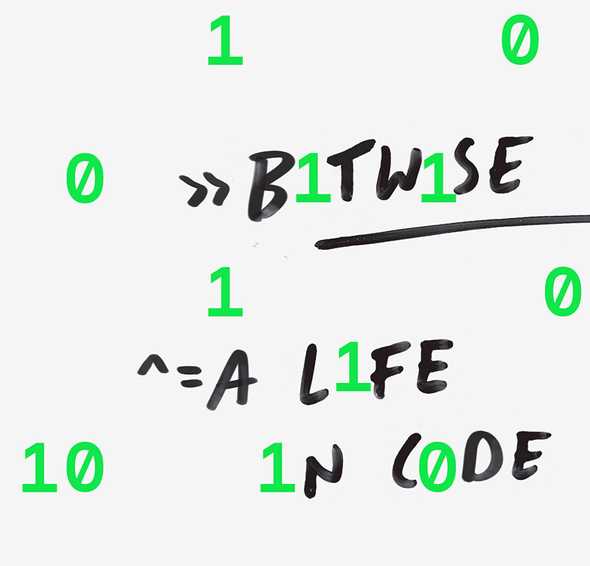A Response to
Bitwise: A Life in Code
March 16, 2020
More than labels.
When I read David Auerbach’s bio at the back of Bitwise and saw that he was both a writer and a programmer, I knew I had to give the book a shot. I, a young black lady in her 20s, a recent graduate just starting on her professional journey saw a piece of myself in this an older white man, seasoned author and software engineer. If we’re going by these labels, we’re way more different than we are alike. But we’re so much more than just labels or demographics. Labels, so easily digestible to computers, are not enough to capture the complex humanity of their subjects. And that’s one of Auerbach’s main premises in Bitwise.
Life as a software program.
Bitwise is a memoir with a message that Auberbach weaves through stories of his professional and personal lives, bringing the reader through his childhood to college to Microsoft to Google to parenthood, showing us along the way how both literature and code entwined with and guided his life. He talks of the impact that the beginner-friendly computer language Logo Writer had on him as a child, opening him to the possibilities of code with the way simple algorithms could create complex graphics. What he describes is a sensation I didn’t feel until I was in college taking my first programming class (Video Game Design): the awe of discovering that you can create fantastic things, make art, with lines of code. The realization that code has the potential to make computers create something you could never do by hand.
That was the start of a lifelong passion for Auerbach, who seems to naturally relate everything in his life to programming. Art. Love and all its complexities and ambiguities. Making a marriage work. The fascinating, terrifying, and often mysterious process of rearing a child—he makes a startlingly accurate likening of a child to the analytic systems of Google and Facebook.
“Code flounders on ambiguity, while literature thrives on it.”
He also discovered a love for literature, reveling in the unique forms of human expression it allows. Books humanized him in ways coding could not by giving him insights into human nature through the people they portrayed and an appreciation for the ingenuity and creativity of the people who wrote them. Literature displays the dizzying variation among humans, explores their motivations, desires, and fears, and studies their astounding complexity in a way that only it can. As Auberach states, “code flounders on ambiguity, while literature thrives on it.”
Perhaps aided by literature’s teachings, and despite his adoration of computers and their languages, Auerbach understands and explains quite clearly the ways in which technology fails to grasp the nuances of human nature: the failure of databases to map human personalities; the failings of the DSM in encompassing human mental disorders; the frustrating limitations of text games in interpreting human language and intent, Facebook’s simplification of gender classification. In computers and their limited grasp of human concepts we see the clashing of what Auerbach describes as analytic impulses and heuristic impulses.
Computers have analytical powers far beyond human capability. They can store various facets of your appearance and personality as bits of data and attach labels to them, but this is a reduction of you, the actual person. A computer might “see” and label me as Liz Nelson, age 25, black, woman, college grad. A database can store my social media likes, web searches, visited places, and so many other bits of data gleaned from online activity, but it can’t try to understand who I am or make an intuitive guess about my character. Humanity is not yet something through which a computer can parse and AI can’t yet exercise intuition, but tech companies are working at bringing AI closer to humanhood to make them better at predicting, analyzing.
How is AI Changing Us?
But are we shaping the computers to be like us or are they shaping us to be like them? According to Auerbach, the answer is both. Yes, Google has gotten better at “understanding” search queries and Facebook evolved to allow users to identify as any of a comparatively wide range of genders, but as we identify more and more with the online, digital versions of ourselves, we subconsciously flatten our personhood to fit the superficial labels that social software is using to track us. This point is where Auerbach’s criticism of technology is sharpest. Computers continually fail to encapsulate humans and our cultural values in sometimes in societally destructive ways, he argues.
Nor does he shy away from commenting on technology’s failings regarding social issues like the fluidity of gendered categorization and racial injustice. He matter-of-factly discusses the ways in which bias and prejudice can and does infect the processes running our imperfect AI systems –like Google’s infamous incident in which it’s face-recognition software labeled black people as gorillas.
A Tale of Two Sides
I found Auerbach’s memoir relatable, but I would have enjoyed it even if I hadn’t. Bitwise is an illuminating and engaging peek into the hyper-rational, quirky, analytical and creative mind of an engineer that also offers a deep reflection on society. He’s able to describe the ways computers function in our human world in a way that even those with the barest minimum of computer knowledge can understand while also succinctly exploring philosophical and sociological concepts in layman terms. Both programming and literature, the analytics and the heuristics, the technical and the imaginative, combine to fill out a compelling picture of Auerbach’s life and character. To Auerbach, love is software that requires continuous debugging, a baby is an algorithmic system, and he is both a small drop in the sea of big data and one multifaceted human in a network of billions.
And he’s not wrong. We’re all complex, evolving systems of algorithms and impulses that our increasingly computer-guided world is constantly striving to quantify, label, and compartmentalize as data. But, as Auerbach asserts, human beings do not fit neatly into the boxes into which databases attempt to store them. As tech companies adapt their software to better collect people as data, they inevitably must move to make software more capable of understanding humans—and this means making them more humanlike through AI.

